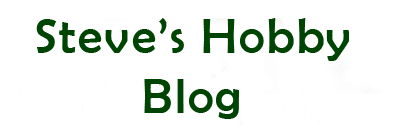This weeks blog is a bit different – it’s supposed to be a picture tutorial as to how I made my Medieval tents for my Never Mind The Bill Hooks army. The idea of the tents, is that you store your army morale tokens in them during the battle. This means that the tents have to have removable tops and I wanted something that was fairly durable. I came up with the idea of using Pringles tubes as the core of the tent but needed a way of making the tube look more tent like! Having done a bit of research on the internet, I found a plan for a full sized Medieval tent on Pinterest, complete with dimensions. When I scaled the dimensions down to 1/48th scale ( a bit on the large size but I can handle the maths easier than working with 1/56th!), it turned out that Pringles tubes were ideal for the job!
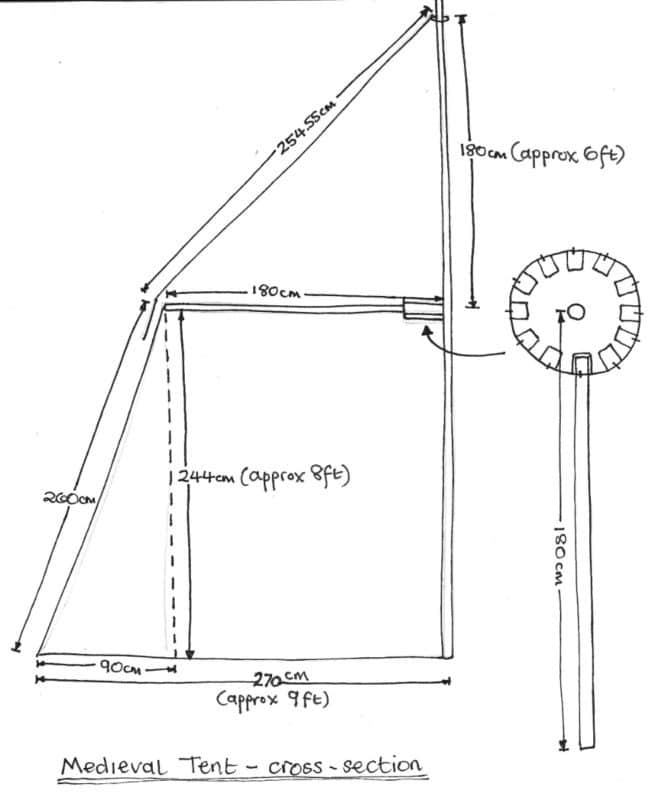
Plan for Knights Tents – Dimensions are for a full sized tent.
I also found a superb youtube video showing how to make Medieval tents for Dungeons and Dragons. The video link is at the end of this article. I was all set to go but first I need to gather the raw materials and tools. I jumped right in and built the first tent in about an hour but wasn’t entirely happy with the result, so I moved onto the second tent. This took a bit longer as I was more careful with the measurements and I made some improvements to the structure. If you would like to have a go at making you own tents, you will need the following tools and materials.
Glue Gun – you can just use PVA but a glue gun is ideal for most of the work here.
Cocktail sticks
Tissues ( kleenex type)
Cardboard or Foam card.
Compass or compass cutter
Sharp knife
Clippers.
Ruler and pencil.
Set Square if you want to be precise with your measuring ( I used the markings on my steel ruler as a guide.)
Step one
Get your Pringles, any flavour, although I like the plain and the sour cream and onions, and eat the contents.
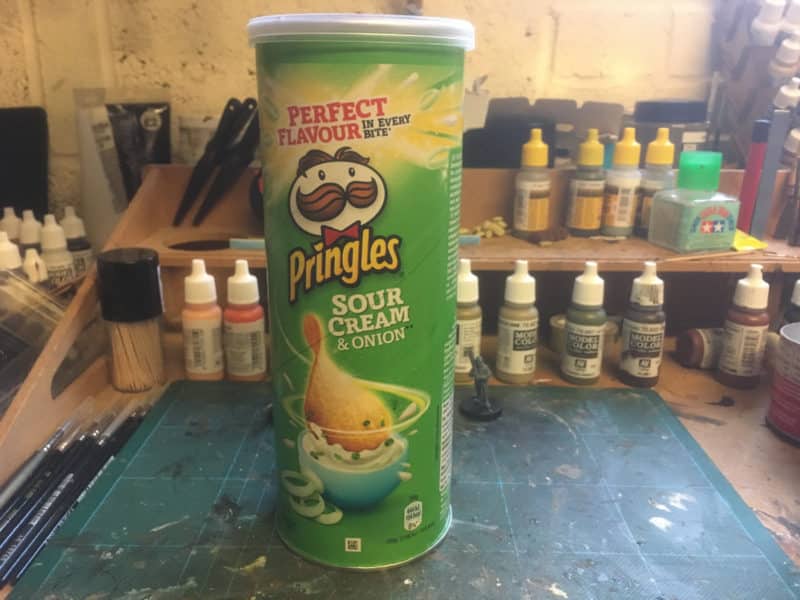
Pringles tube! First task is to empty it!
You may need some lubrication to help with the Pringles. Beer seems to work well, my current favourite is Shipyard!
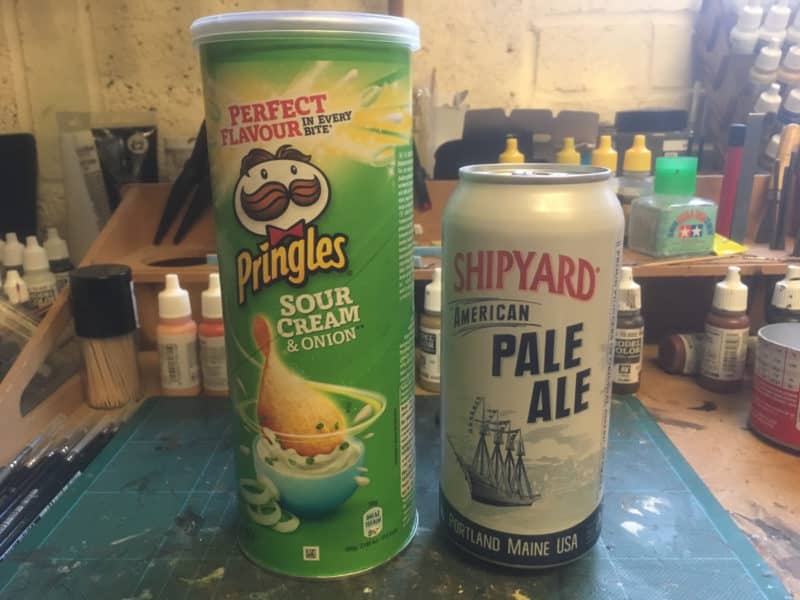
You may find that you get thirsty eating Pringles!
Cut the base of the Pringles tube off ( the end with the metal base.) using a sharp knife. It’s tricky getting a straight cut around a tube. I used a felt tip pen blu-tacked to my work board, exactly 5cms from the side and holding the tube firmly against the edge, rotated it so that the pen marked a guide line around the tube. I then cut through the tube using my scalpel. Dont worry if you dont get an exact straight edge to your cut, the top will hide any errors.
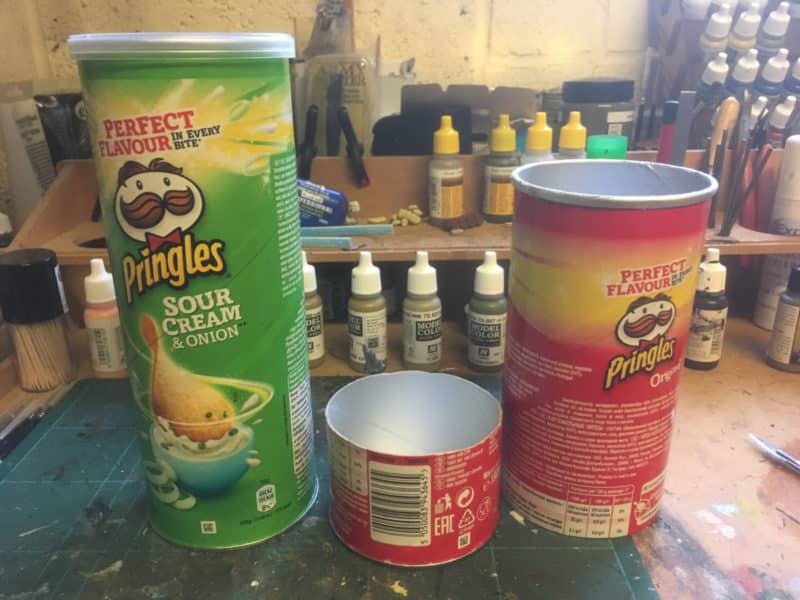
The first tube cut down. The height of the cut is 5cms – you can make this smaller if you prefer.
The next task is to cut out two circles. One at 11 cms in diameter will be for the base of the tent – I used a compass cutter for this task on the second tent rather than a compass and scalpel that I used for the first tent. The other circle is the same width as your pringles tube – just draw around it. The tent base is made from cardboard. The top is foam card. You could use cardboard for the top but I wanted to give the top a bit of strength.
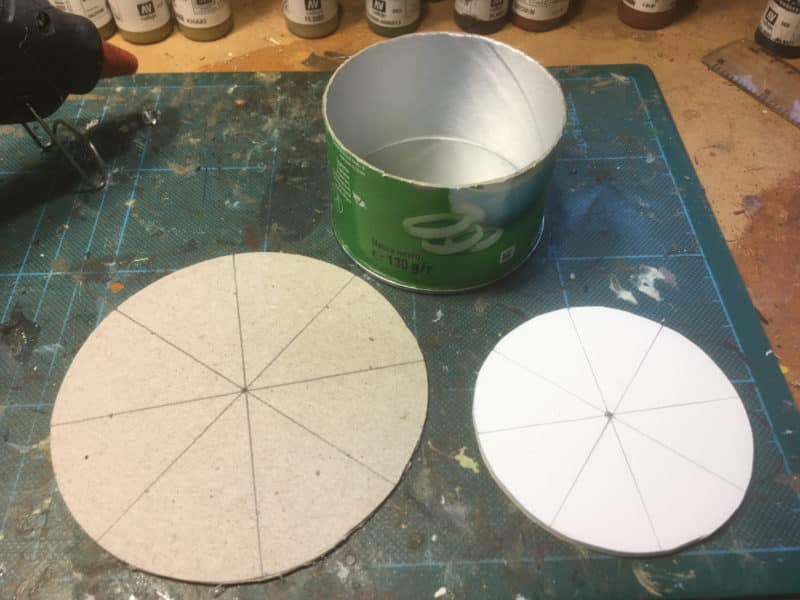
Circles cut out – note that I have marked out the centre and divided them into eight segments with pencil lines.
Next glue the pringles tin to the base, making sure that you have it centred as best as you can. Using the pencil marks as a guide, glue eight cocktail sticks to the base and tube as shown below.
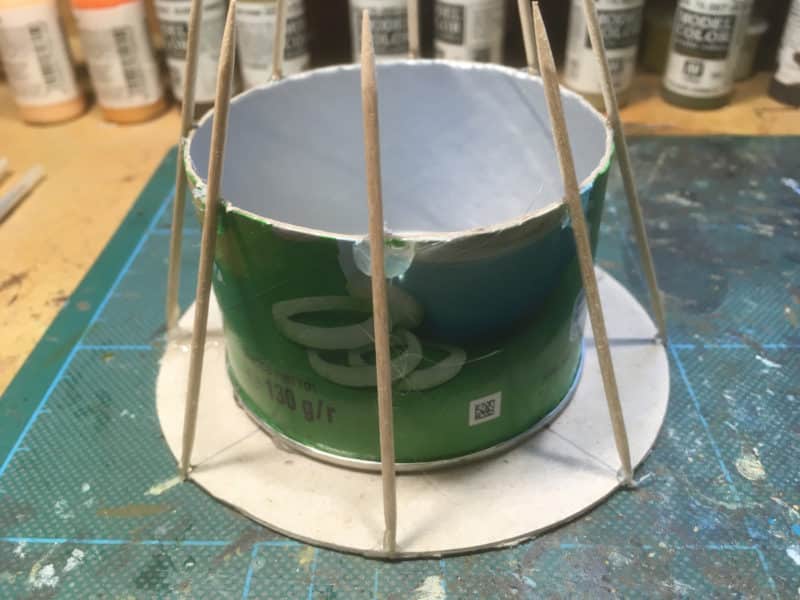
Cocktail sticks added to form the structure
I used my flush cutters to clip off the excess length of the cocktail stick. I then took the top disk of the tent and glued a cocktail stick through the exact centre. You need to leave about 5cms of this cocktail stick as the centre pole. Using my clippers. I then cut eight more cocktail sticks( at a slight angle on one end) and glued them to the centre pole at 3.75cms up the pole and again, used the eight pencil marks as a guide.
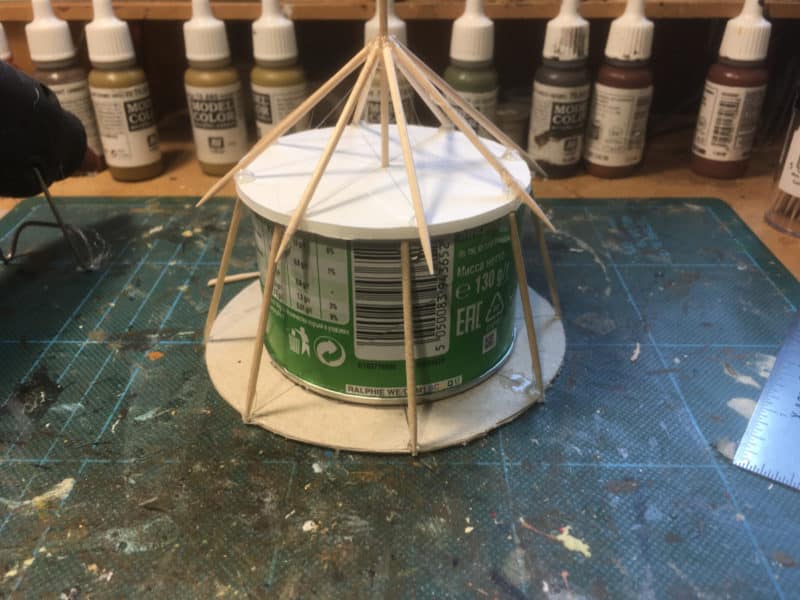
top of the tent in place – dont glue this – you need to be able to remove it!
The next part of the process is both the trickiest and the most messy! I used standard three ply kleenex tissues cut roughly to size and dipped in watered down PVA to clad the base of the tent. I left one section opened and used two pieces of tissue to make the open door.
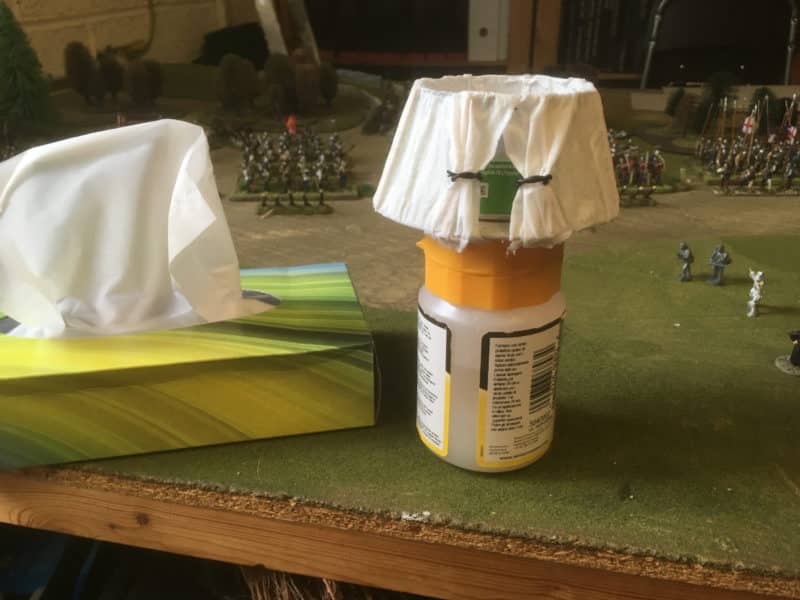
Tissue covering the main structure – complete with tie backs on the ‘door’!
There’s no doubt that this is the trickiest part of the operation. I did find that it was easier to place the tissue on the structure and using a large brush, ‘paint on’ the PVA. With hind sight, I think that Crepe paper or perhaps kitchen towelling would have worked better as these products are stronger and less likely to rip when wet. Also, for some reason, I felt the need to explain to my wife why I was going out to the garage with a box of tissues, pringles and my iPad….
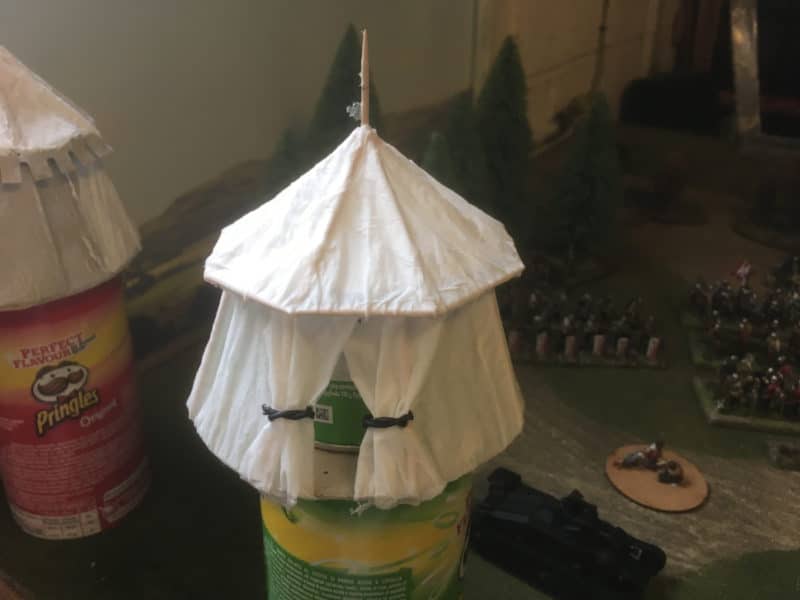
Tent with tissue added to the roof.
The whole structure was left to dry for at least 24hours. I then spray primed the tents with Army Painter skeleton bone and dry brushed them with white.
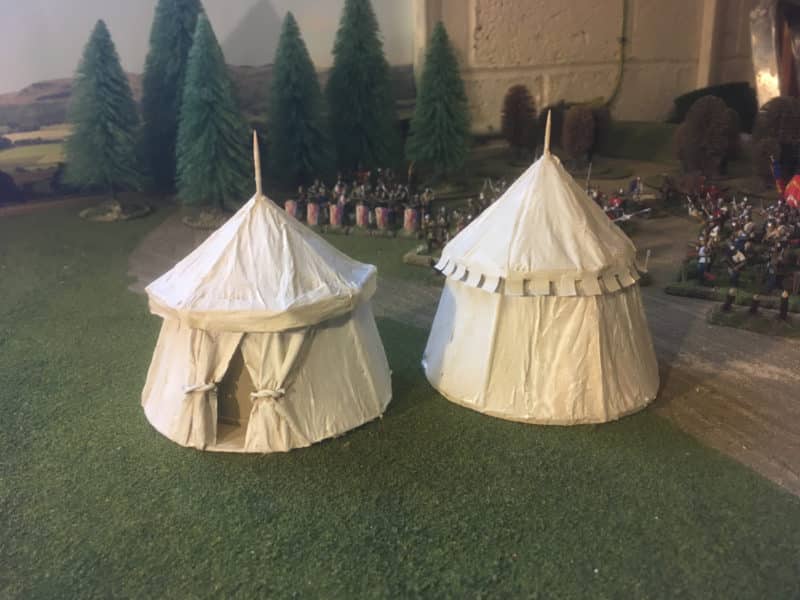
The two tents primed and ready for painting.
The tent on the right was my first attempt. I’m not entirely happy with this one as I got into a bit of a mess with the tissue and I’ve used some filler to try to hide mistakes – if you look closely you will see that I haven’t been too successful! I only used six ‘poles’ for the structure rather than eight. I’ve also added a decorative edge to the top.
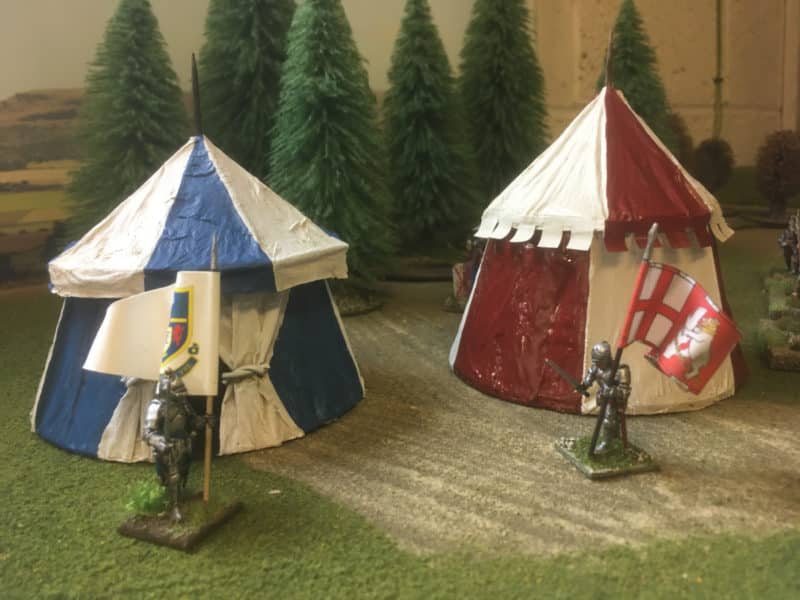
The painted tents
I then painted alternate segments of the tents – Prussian blue for one and Burnt red ( my new favourite colour) for the other.
The tops are removable so that you can store your army morale tokens:
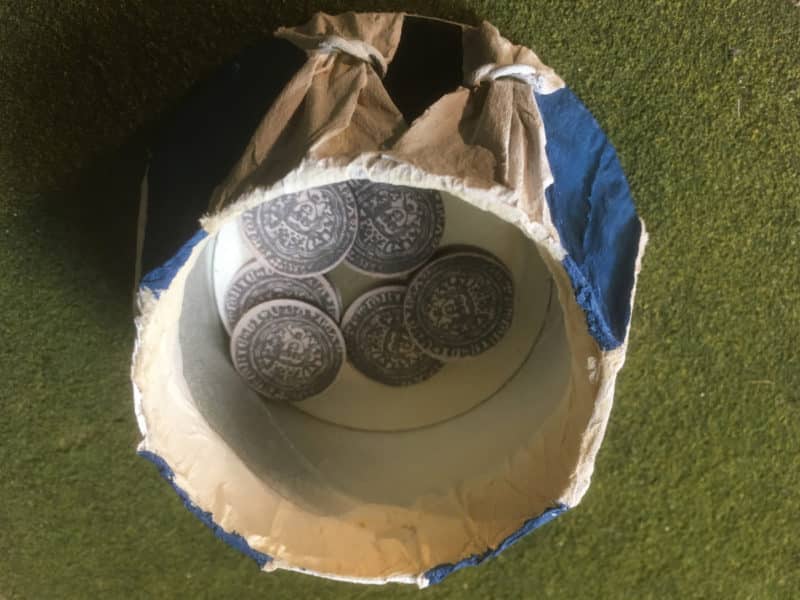
Storage section revealed! Big enough to get your hand into pick out the tokens.
The final touch was to add a bit of dry brushing to the colour panels and to add some flags. Here are the finished tents on my wargames table.
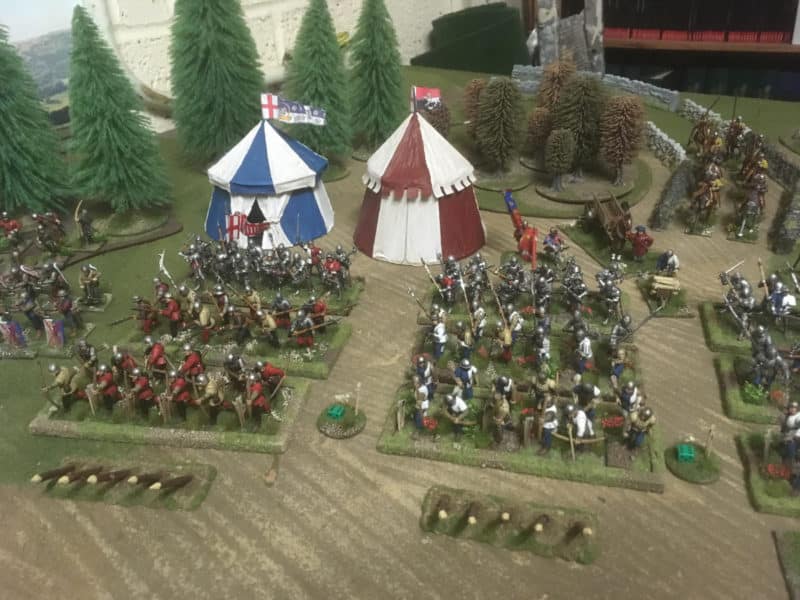
The finished tents.
I’ll be honest, they do look better from a distance than close up. I have learnt a few lessons whilst building these and in the future, I may add a few more tents to my scenery – perhaps trying crepe paper rather than tissue. But for now, they serve their purpose and function as a place to store the army morale tokens. Talking of learning, here’s a couple of really useful videos.
The next video shows where I ‘borrowed’ the idea of using tissue to make the tents. There are some amazing ideas here and I will be stealing a few more of his tips to make some different style tents in the future. The guy who makes these videos has a whole series of fantastic terrain videos that are well worth your time if you enjoy building scenery.
I hope that you find the above helps. as usual, here’s the commercial bit, although I dont sell Pringles, Cocktail sticks or Tissues….
THE COMMERCIAL BIT
Almost all of the paints, miniatures, bases, basing materials and anything that you are likely to need for your hobby are available POST FREE from my shop here:
To find PVA glue, click here:
Perry’s WOTR plastic range are here, including some nice army deals!
You can see our Woodlands scenics range, including water effects, here:
Gamers grass tufts can be found here:
Vallejo plastic filler and Milliput is available here:
MDF bases can be found here:
You can find all the Vallejo Model colour paints here. If you don’t want to browse, just enter the paint number into the shop search bar;
Happy Modelling!
